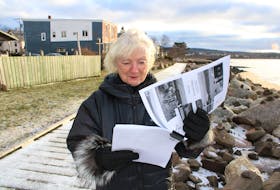
PICTOU LANDING – Maurina Beadle sits on a swing with her son Jeremy on a sunny afternoon and as she sings he smiles and beats a small drum. He loves music and loves his mother.
It may seem like a simple feat, but it is something that when her son was born, doctors would have said he couldn’t do.
But Beadle is a fighter.
She didn’t quit when doctors told her Jeremy would never walk or talk. She didn’t quit when she had a stroke and was told she would be wheelchair bound. And she’s not about to quit now as she fights for federal funding to give proper care for her son at their home in Pictou Landing.
“The battle isn’t half way over. It’s just begun,” she said Tuesday at her home, a day after closing arguments were made in the family’s court battle for funding in Federal Court. “I don’t know if I’m going to win it, but I’m going to give it a darn good try. That’s one thing about me, I don’t quit.”
Ottawa lawyer Paul Champ has led the legal fight for Beadle and the Pictou Landing Band Council and believes it is a case they should and could win, although the outcome won’t be known for a couple of months.
But this isn’t just a personal battle, he said. The case could be precedent setting in that they’re fighting for an equal level of support for people on reserves as those who live elsewhere.
“I think there’s a long history of underfunding of public services for reserves,” he said.
Contrary to the ugly stereotypes that suggest First Nations communities get more than non-natives, it’s actually quite the opposite and this case shows that, he said.
Jeremy Meawasige is now 17. He has multiple disabilities and has been diagnosed with hydrocephalus, cerebral palsy, spinal curvature and autism. He needs total personal care including showering, diapering, dressing, spoon feeding and all personal hygiene needs. He can also become self-abusive at times, and needs to be restrained for his own safety.
Continuing care services in home are generally public services provided by provincial governments, but the provincial governments refuses to extend those same services to First Nations children on reserves because they say that falls in federal jurisdiction, Champ said in a memo stating the facts of the case. The federal government has assumed responsibility for funding continuing care programs and services at levels “reasonably comparable” to those offered by the province.
But that support hasn’t come through for Jeremy. Two years ago Beadle had a stroke, which left her unable to care for her son on her own. The federal government does give money to the Pictou Landing Band Council to deliver continuing care services for the reserve, but it has said the funds are inadequate to meet Jeremy’s needs. When the band asked for additional funding from the government in May 2011 it was denied. The response they got said such services would be in excess of “normative standard of care.”
Champ disagrees however and in court has argued that Jeremy would have received better care if he didn’t live on the reserve and should therefore get the same treatment on the reserve.
The government’s decision, he said, violates Beadle’s right to equal benefit of the law and constitutes discrimination. He said the band council has essentially been running a deficit to provide the care Jeremy needs and wants to be reimbursed.
Beadle hopes for a positive resolution and says she will never allow her son to be taken to a special care unit off the reserve.
“I’m not just fighting for my son,” she said. “I’m fighting for all the children across Canada.”
From her own experience she knows it is best for her son to be at home on the reserve. It was there she taught him to walk with assistance and with her hours of encouragement he learned to talk. It’s where he’s happiest.
“This is where he’s getting all his love,” she said. “He wouldn’t have made any progress if I hadn’t been so stubborn. At home in the community is where these special needs children belong.”
And that’s something she will fight for.
“I’m going to continue for as long as they keep saying no to me, I’m going to continue until I get something done for those children.”








